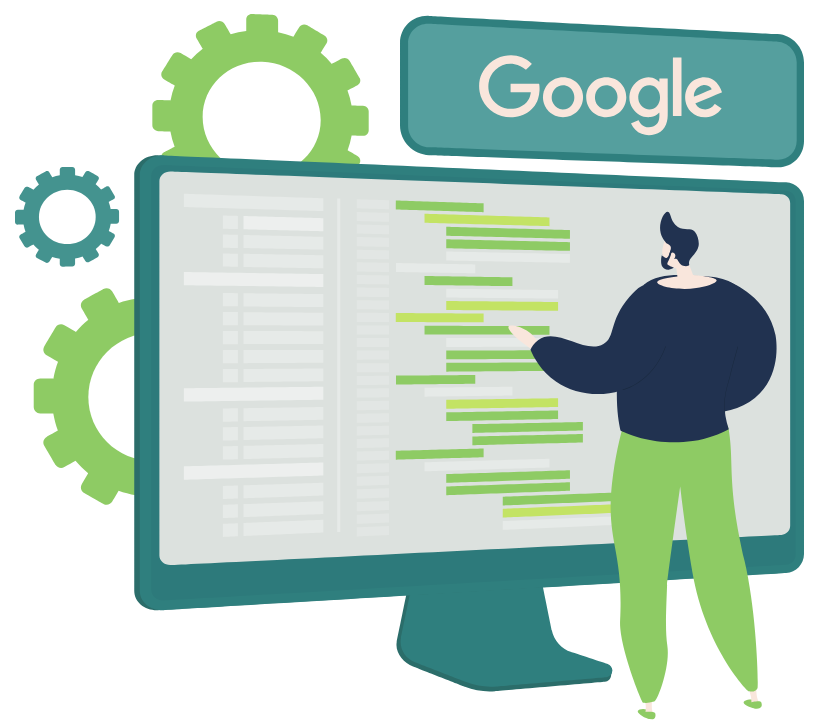Google Index Checker: Check Your Web Pages Are Indexed By Google
Google indexing is the process through which Google crawls and catalogs information from web pages, storing this data in its database. This procedure is essential for websites because it determines whether your site appears in search engine results pages (SERPs). Without proper site indexing, your website might remain invisible to potential visitors, regardless of the quality of its content.
The indexing process involves Google's web crawlers, also known as bots or spiders, which scan and gather data from websites. These web indexers follow links from one page to another, creating a comprehensive map of the web that helps Google understand the content and relevance of each page. This process is continuous, ensuring that Google's index stays up-to-date with the latest information from across the internet. Tools like a Google link checker can help monitor this process.
Effective SEO indexing is crucial because it directly influences your site's visibility. If Google cannot index your pages, they will not appear in search results, significantly limiting your organic traffic. Therefore, understanding and optimizing for Google indexing is a foundational aspect of any SEO strategy. This includes ensuring that your site's structure, content, and metadata are all optimized for Google's crawlers. Using a Google index checker, site indexer, and link indexing tools can help ensure that all your critical content is indexed and visible in SERPs. Additionally, managing attributes like noindex nofollow can help control which pages are indexed and how they are treated by search engines.
The Importance of SEO Indexing
SEO indexing is a fundamental process in which search engines like Google store and organize the information found on web pages. This process is crucial for ensuring that your content appears in search results when users query relevant terms. Without proper indexing, even the most valuable content can remain hidden from potential visitors.
Effective SEO indexing directly impacts your website's visibility and ranking on search engine results pages (SERPs). When a page is indexed, it means Google has recognized its existence and can display it in response to relevant searches. This is why monitoring the indexing status of your pages using tools like a Google Index Checker is essential for maintaining a healthy SEO profile.
In addition to improving visibility, proper SEO indexing ensures that your content is discoverable by the right audience. By optimizing your pages for indexing, you can target specific keywords and queries that are relevant to your audience. This targeted approach helps in driving quality traffic to your site, increasing engagement, and ultimately boosting conversions.
GOOGLE BULK INDEX CHECKER
The Google bulk index checker is aiming to manage the indexing status of their websites efficiently. By utilizing this tool, users can quickly determine which pages of their website are indexed by Google. This is crucial for ensuring that their site's content is discoverable through search engines. Google index checker tools help to streamline the process of checking multiple URLs simultaneously, saving significant time compared to manual checks. This functionality is essential for maintaining an up-to-date and healthy SEO index, which directly influences a site's visibility and ranking on Google.
Site indexing is a fundamental aspect of SEO, and the Google Bulk Index Checker plays a pivotal role in optimizing this process. SEO indexing involves ensuring that web pages are properly indexed by search engines like Google, making them accessible to users through search queries. Tools like the Google link checker assist in verifying that all internal and external links on a website are working correctly, further supporting effective site indexing. By using a site indexer, webmasters can identify and resolve issues related to noindex nofollow tags, which may unintentionally prevent pages from being indexed. Keeping track of indexed pages helps in monitoring the performance and reach of website content.
Effective link indexing and site indexing practices are critical for achieving optimal search engine performance. A web indexer helps in managing and monitoring the indexing status of various web pages, ensuring that each page is appropriately indexed and visible to search engines. By regularly using tools like the Google bulk index checker , SEO professionals can maintain a comprehensive view of their indexed pages, promptly addressing any indexing issues that arise. This proactive approach ensures that a website remains accessible, user-friendly, and competitive in the digital landscape, ultimately enhancing its search engine ranking and online presence.
Maximize Your Page Rankings and Efficiency with Our Comprehensive Google Index Checker
Are you looking to elevate your website's performance and maximize its visibility on search engines? If so, you're in the right place. In today's digital landscape, achieving a high ranking on Google is crucial for driving traffic and growing your online presence. One essential tool in your SEO arsenal is a reliable Google index checker. In this post, we'll delve into the importance of monitoring your website's indexation status and how our comprehensive SEO Metrics Checker can help you achieve optimal results.
Understanding Website Indexation
Before we dive into the details of our Google Index Checker, let's first understand what website indexation is and why it's vital for your SEO strategy. website indexing tool free refers to the process by which search engines like Google crawl and store web pages in their database. When a page is indexed, it becomes eligible to appear in search results when users enter relevant queries. However, if your pages are not indexed, they won't show up in search results, severely limiting your online visibility.
In the ever-evolving digital landscape, understanding website indexation is paramount for enhancing your online visibility and driving organic traffic to your website. By implementing the strategies outlined in this guide, you can optimize your site for better indexation and improve its chances of ranking higher in search engine results. Remember, website indexation is not a one-time task but an ongoing process that requires continuous effort and optimization. Stay proactive, stay relevant, and watch your website soar to new heights in the digital realm.
The Importance of Monitoring Indexation
Monitoring your website's indexation status is crucial for several reasons. Firstly, it allows you to ensure that all your important pages are being crawled and indexed by search engines. If certain pages are not indexed, it could indicate issues with your site's structure or accessibility that need to be addressed. Additionally, monitoring indexation can help you identify and rectify any duplicate content or crawl errors that may be negatively impacting your SEO efforts.
Now that we understand the importance of monitoring indexation, let's explore some tips for doing so effectively:
Introducing Our Google Index Checker
In order to optimize web pages, most webmasters prefer Google search engine. This implies that Google can determine how much traffic you are likely to get from your website since it is the largest search engine out there. To ascertain if your site meets all the requirements for indexation by Google’s robots and highlighted in all their pages or just a few, make use of the site’s internal search engine. These internal links should carry significant keywords so as to increase a page rank of the linked document. This involves creating an account in which you sign up as a user then type in the URL for your website(s), click on “Check” button and then view its statistics on indexing within seconds after observing its progress.
Our Google Index Checker is a user-friendly tool designed to provide you with valuable insights into your website's indexation status. Here's how it works:
Key Features of Our Google Index Checker
- Real-time Monitoring: Our tool continuously monitors your website's indexation status, providing you with up-to-date information on which pages are indexed and which are not.
- Detailed Reports: We provide detailed reports that highlight any issues affecting your website's indexation, such as crawl errors, duplicate content, or pages blocked by robots.txt.
- Actionable Insights: Our tool offers actionable insights and recommendations to help you address any issues and improve your website's indexation efficiency.
- Easy Integration: Our tool seamlessly integrates with your existing SEO workflow, making it easy to incorporate indexation monitoring into your overall optimization strategy.
- User-Friendly Interface: Our Google Index Checker is designed to be user-friendly and intuitive, making it easy for even novice users to navigate and understand.
Maximize Your Page Rankings with Our Google Index Checker
If you want to make sure that your website is completely optimized for search engines, use our Google Index Checker. You will be able to boost your site’s rankings and attract more visitors by sorting out indexation problems. Do not ignore this! Use Google Index Checker now and let your site reach its full potential on the web.
In today’s competitive SEO environment, getting higher page rankings on Google is essential in order to get organic traffic and succeed online. Our Google Index Checker provides insights about your website’s indexation status, helps identify issues, and offers proactive actions for optimizing your indexing strategy. Don’t leave anything to chance as far as page rankings are concerned—be equipped with relevant tools for success. Stop delaying! Get yourself a Google Index Checker; it will help you realize the immense benefits of having visible websites on search engines.
Utilizing Google Link Checker for Site Health
A Google Link Checker is another invaluable tool in the arsenal of an SEO professional. It allows you to analyze the links on your website to ensure they are working correctly and pointing to valid destinations. Broken or outdated links can significantly harm your site's user experience and SEO performance, making regular link checks a necessity.
The Google Link Checker helps identify broken links, which are links that no longer lead to their intended destinations. These links can result from deleted pages, changes in URL structure, or typographical errors. By identifying and fixing broken links, you can improve the user experience on your site, as users will not encounter frustrating dead ends.
Furthermore, a Google Link Checker helps maintain the integrity of your site's internal linking structure. Internal links are crucial for SEO as they help search engines understand the hierarchy and context of your content. By ensuring all internal links are functional, you enhance the crawlability of your site, making it easier for Google to index your pages effectively.
Conclusion
In conclusion, monitoring your website's indexation status with a Google Index Checker is essential for maximizing your page rankings and efficiency. By regularly checking your site's indexing status, you can identify and resolve issues, ensuring that all your important content is indexed and visible to search engines. Utilizing tools like Google link checkers and site indexers, you can enhance your SEO strategy, improve your website's visibility, and drive more organic traffic to your site. Stay proactive, optimize your site for better indexation, and watch your website soar to new heights in the digital landscape.











